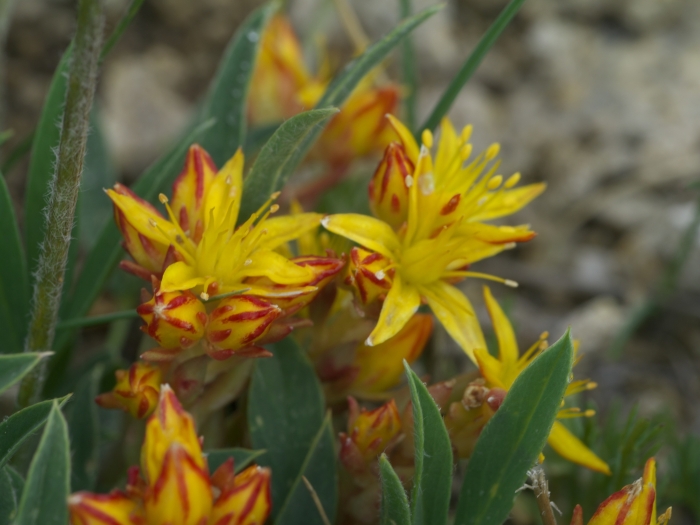Spearleaf Stonecrop
(Sedum lanceolatum)
Spearleaf Stonecrop (Sedum lanceolatum)
/
/

Robert Webster
CC BY-SA 4.0
Image By:
Robert Webster
Recorded By:
Copyright:
CC BY-SA 4.0
Copyright Notice:
Photo by: Robert Webster | License Type: CC BY-SA 4.0 | License URL: http://creativecommons.org/licenses/by-sa/4.0/ | Rights Holder: Robert Webster | Publisher: iNaturalist | Date Created: 2013-07-29T17:36:51-07:00 |









Estimated Native Range
Summary
Sedum lanceolatum, commonly known as spearleaf stonecrop, is a perennial succulent native to the rocky alpine and subalpine zones of western North America, including regions from Alaska to Arizona. It is particularly adapted to high elevations, often found at heights up to 13,281 feet (4,048 meters). This plant typically forms dense mats or basal rosettes of fleshy, pointed leaves that are green to gray-green in color. During the summer months, it produces clusters of star-shaped yellow flowers that are quite showy and attract pollinators.
Spearleaf stonecrop is valued for its hardiness and ability to thrive in poor, rocky soils with excellent drainage. It is often used in rock gardens, as a ground cover, or in green roof installations due to its low maintenance requirements and tolerance of drought. In cultivation, it prefers full sun to light shade and requires minimal water once established. While it is not commonly afflicted by diseases, overwatering can lead to root rot. Spearleaf stonecrop is also noteworthy for its ecological role as the host plant for the Parnassius smintheus butterfly, which uses the plant’s deterrent compound, sarmentosin, as a defense mechanism. Gardeners should be aware that while it is a beneficial plant for native butterflies, it can spread vegetatively and may need to be managed to prevent unwanted colonization in small garden spaces.CC BY-SA 4.0
Spearleaf stonecrop is valued for its hardiness and ability to thrive in poor, rocky soils with excellent drainage. It is often used in rock gardens, as a ground cover, or in green roof installations due to its low maintenance requirements and tolerance of drought. In cultivation, it prefers full sun to light shade and requires minimal water once established. While it is not commonly afflicted by diseases, overwatering can lead to root rot. Spearleaf stonecrop is also noteworthy for its ecological role as the host plant for the Parnassius smintheus butterfly, which uses the plant’s deterrent compound, sarmentosin, as a defense mechanism. Gardeners should be aware that while it is a beneficial plant for native butterflies, it can spread vegetatively and may need to be managed to prevent unwanted colonization in small garden spaces.CC BY-SA 4.0
Plant Description
- Plant Type: Herb
- Height: 0.5-1 feet
- Width: 0.5-1 feet
- Growth Rate: Moderate
- Flower Color: Yellow
- Flowering Season: Spring, Summer, Fall
- Leaf Retention: Semi-deciduous
Growth Requirements
- Sun: Full Sun
- Water: Medium, High
- Drainage: Medium, Fast
Common Uses
Border Plant, Butterfly Garden, Drought Tolerant, Groundcover, Low Maintenance, Rock Garden, Street Planting
Natural Habitat
Rocky alpine and subalpine zones of western North America
Other Names
Common Names: Rocky Mountain Stonecrop, Spearleaf Stonecrop, Lance-Leaved Stonecrop, Common Stonecrop, Spear-Leaved Stonecrop
Scientific Names: , Sedum lanceolatum, Sedum lanceolatum subsp. typicum, Sedum stenopetalum var. alpinum,
GBIF Accepted Name: